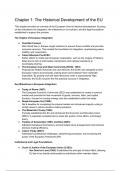Chapter 1: The Historical Development of the EU
This chapter provides an overview of the European Union's historical development, focusing
on the motivations for integration, the milestones in its evolution, and the legal foundations
established to support the process.
The Origins of European Integration
● Post-War Context:
After World War II, Europe sought solutions to prevent future conflicts and promote
economic recovery. This created the foundation for integration, emphasizing peace,
stability, and cooperation.
● Failed Attempts Pre-ECSC:
Earlier efforts to create pan-European cooperation, such as the League of Nations,
failed due to lack of enforceable mechanisms and national resistance to
sovereignty-sharing.
● The European Coal and Steel Community (ECSC, 1951):
Proposed by Robert Schuman and Jean Monnet, the ECSC was designed to bind
European nations economically, making future wars between them materially
impossible. By pooling coal and steel resources under a supranational High
Authority, the ECSC became the first practical success in integration.
Key Milestones in European Integration
● Treaty of Rome (1957):
The European Economic Community (EEC) was established to create a common
market and promote the free movement of goods, services, labor, and capital.
Euratom, focused on nuclear energy, was also established under this treaty.
● Single European Act (1986):
Set a deadline for completing the internal market and introduced majority voting in
certain areas to reduce decision-making paralysis.
● The Maastricht Treaty (1992):
Formally established the EU and introduced the Economic and Monetary Union
(EMU). It expanded competencies to areas like justice, home affairs, and foreign
policy.
● Treaties of Amsterdam (1997) and Nice (2001):
Adjusted institutional structures to accommodate future enlargements and enhance
decision-making efficiency.
● Lisbon Treaty (2007):
Addressed constitutional challenges, streamlining processes, and increasing the
power of the European Parliament (EP).
Institutional and Legal Foundations
● Court of Justice of the European Union (CJEU):
○ Van Gend en Loos (1963): Established the principle of direct effect, allowing
EU law to be directly enforceable by individuals within member states.
, ○ Costa v. ENEL (1964): Introduced the principle of EU law supremacy,
asserting that EU law overrides conflicting national laws.
○ These rulings enhanced the legal authority of the EU and were often cited as
examples of judicial activism.
Debates on Integration
● The EU's evolution raises questions about its legitimacy, balancing supranational
authority with respect for national sovereignty, and addressing the democratic deficit.
Chapter 2: Theoretical Approaches to
Understanding the EU
This chapter discusses the main theoretical frameworks used to analyze the EU, highlighting
their assumptions and implications.
Theories of European Integration
● Neofunctionalism:
○ Emphasizes spillover effects, where integration in one sector leads to further
integration in related areas.
○ Focuses on the role of supranational institutions like the European
Commission in driving integration.
○ Criticism: Underestimates the importance of national governments and
domestic politics.
● (Liberal) Intergovernmentalism:
○ Sees integration as a product of rational state actors negotiating to maximize
national interests.
○ Key elements include economic preferences, interstate bargaining, and
institutional choice.
○ Criticism: Lacks explanation for the role of supranational institutions and
informal processes in integration.
● Postfunctionalism:
○ Highlights the role of identity and public opinion in shaping integration.
○ Argues that increasing integration can lead to backlash as citizens feel
disconnected from elite-driven processes.
Institutionalist Perspectives
● Rational Choice Institutionalism:
○ Views institutions as frameworks within which actors pursue their preferences
strategically.
○ Highlights the importance of rules and procedures in shaping outcomes.
● Historical Institutionalism:
○ Examines how decisions made at critical junctures create path dependency,
making reversal or deviation difficult.





